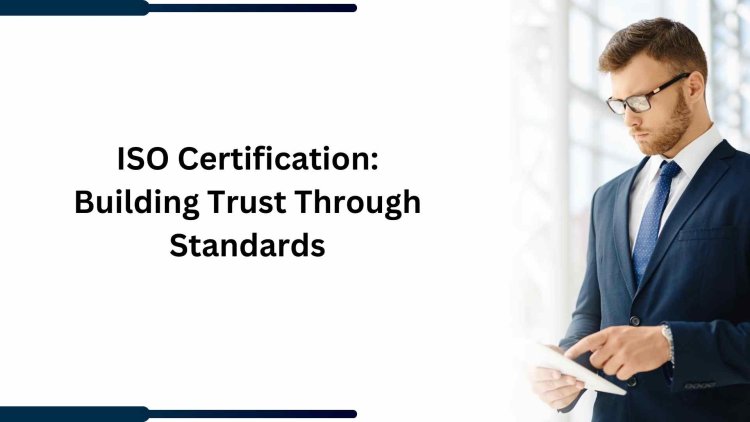ISO Certification: Building Trust Through Standards
The International Organization for Standardization (ISO) is an independent organization that creates and publishes standards aimed at ensuring quality, safety, and efficiency in products, services, and systems worldwide.

In today's competitive global marketplace, trust is a cornerstone of success. For businesses, trust fosters customer loyalty, ensures compliance, and enhances reputation. One of the most recognized and effective ways to build and sustain this trust is through ISO Certification. By adhering to internationally accepted standards, organizations demonstrate their commitment to quality, safety, and efficiency. This article explores the importance of ISO certification, its benefits, and how it empowers businesses to thrive in an increasingly interconnected world.
What is ISO Certification?
The International Organization for Standardization (ISO) is an independent organization that creates and publishes standards aimed at ensuring quality, safety, and efficiency in products, services, and systems worldwide. These standards are designed to provide a framework for consistent operations and quality assurance, benefiting businesses and consumers alike. ISO certification is awarded to organizations that meet specific ISO standards. Certification is typically conducted by external certification bodies that evaluate a company’s processes and systems against the chosen standard.
Key ISO Standards
ISO has developed thousands of standards covering various industries and applications. Some of the most popular ISO certifications include:
-
ISO 9001: Quality Management Systems (QMS): Focuses on ensuring consistent quality in products and services, improving customer satisfaction.
-
ISO 14001: Environmental Management Systems (EMS): Addresses environmental impact, helping businesses reduce waste and improve sustainability.
-
ISO 27001: Information Security Management Systems (ISMS): Ensures data protection and helps organizations safeguard sensitive information.
-
ISO 45001: Occupational Health and Safety (OHS): Aims to improve workplace safety and reduce risks.
-
ISO 22000: Food Safety Management Systems (FSMS): Focuses on food safety standards for organizations in the food supply chain.
-
ISO 50001: Energy Management Systems: Helps organizations manage energy use efficiently and reduce consumption.
The Importance of ISO Certification
ISO certification goes beyond compliance; it represents a strategic advantage for businesses. Here’s why it matters:
1. Building Customer Trust: ISO-certified organizations demonstrate their commitment to quality, safety, and reliability. Customers are more likely to trust and engage with businesses that have undergone rigorous certification processes.
2. Ensuring Compliance: Many industries are governed by strict regulatory frameworks. ISO certification helps businesses meet these requirements, avoiding potential legal issues and penalties.
3. Enhancing Global Competitiveness: ISO standards are recognized worldwide. Certification provides a passport to global markets, making it easier for businesses to expand internationally.
4. Driving Operational Efficiency: ISO standards emphasize best practices, leading to streamlined operations, reduced waste, and increased productivity.
5. Improving Stakeholder Confidence: Investors, partners, and suppliers view ISO certification as a mark of credibility, enhancing their confidence in the organization.
Benefits of ISO Certification
ISO certification offers tangible benefits that impact various aspects of an organization:
-
Improved Quality Control: ISO standards focus on continuous improvement, ensuring products and services consistently meet or exceed customer expectations.
-
Cost Savings: By identifying inefficiencies and optimizing processes, ISO certification reduces waste and operational costs.
-
Risk Mitigation: Standards like ISO 27001 and ISO 45001 help businesses manage risks effectively, from cybersecurity threats to workplace hazards.
-
Employee Engagement: ISO-certified organizations foster a culture of excellence, motivating employees and encouraging their involvement in achieving quality goals.
-
Market Differentiation: ISO certification sets businesses apart from competitors, serving as a unique selling point (USP).
-
Supply Chain Confidence: ISO-certified suppliers are preferred in procurement processes, ensuring consistent quality across the supply chain.
Steps to Achieve ISO Certification
The process of obtaining ISO certification can be broken down into manageable steps:
1. Visit the Website: Go to the ISO certification website to start the process.
2. Choose Your ISO Standard: Choose your business-based certificate( ISO 9001, ISO 14001, ISO27001 etc)
3. Fill Out the Form: Complete the online form with basic details
4. Pay the Fee: Complete the payment for the required fee.
5. Verification: An executive will check your payment and process your application.
6. Confirm Your Certificate: Discuss with the client and issue the certificate.
7. Receive Your Certificate: After everything is done, your ISO certificate will be emailed to you.
How ISO Certification Empowers Businesses
ISO certification empowers businesses in multiple ways:
-
Sustainability: Standards like ISO 14001 encourage businesses to adopt eco-friendly practices, reducing environmental impact.
-
Data Security: ISO 27001 helps organizations safeguard customer and business data, enhancing trust and compliance.
-
Workplace Safety: ISO 45001 ensures safer workplaces, reducing accidents and improving employee satisfaction.
-
Customer Focus: Standards like ISO 9001 prioritize customer satisfaction, ensuring businesses deliver high-quality products and services consistently.
Note: You can also Apply for ISO 9001 Certificate in India
Conclusion
ISO certification is more than just a mark of compliance; it is a strategic tool that builds trust, enhances credibility, and drives growth. By adhering to globally recognized standards, businesses can position themselves as reliable, efficient, and customer-focused.
What's Your Reaction?





















